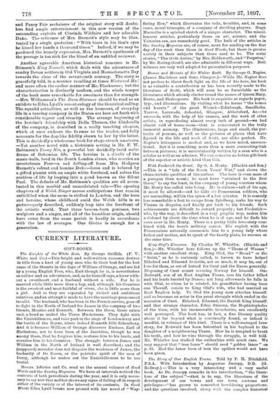CURRENT LITERATIJRE.
GIFT-BOOKS.
The Knights of the White Rose. By George Griffith. (F. V. White and Co.) —This bright and well-written romance derives its title from a knot of young men who do their best for the lost cause of the Stuarts in the days of William of Orange, and are led by a young English Peer, who, Earl though he is, is nevertheless an outlaw and an adventurer, and, as he himself says, a lover with- out a sweetheart and a husband without a wife. For he is married while little more than a boy, and, although his Countess is the sweetest and most faithful of wives, she is little more than a girl. And so they are separated by wicked and ambitious relatives, and an attempt is made to have the marriage pronounced invalid. The husband, who has been in the French service, goes off to fight in the North of Ireland for James in the company of two friends, Maurice and Kenneth. Between the three, there exists such a bond as united the Three Musketeers. They fight with the Enniskilleners, and take part in the siege of Londonderry and the battle of the Boyne, where indeed Kenneth kills Schomberg. And it is because William of Orange discovers Eustace, Earl of Harlestone, not to have been of the Jacobites, though he was among them, that he forgives him, restores him to his lands, and ceunites him to his Countess. The struggle between James and William in the North of Ireland is well described; and the (supposed) narrator does not disguise the weakness of James, the barbarity of De Rosen, or the patriotic spirit of the men of Derry, although he makes out the Enniskilleners to be too brutal.
Messrs. Isbister and Co. send us the annual volumes of Good Words and the Sunday Magazine. We have at intervals noticed the contents of both periodicals during the year, and it is only neces- sary to say now that neither shows any signs of falling off in respect either of the variety or of the interest of its contents. In Good Words Edna Lyall breaks new ground with her novel of "Way- faring Men," which illustrates the toils, troubles, and, in some cases, moral triumphs, of a company of strolling players. Hugh Macneilie is a spirited sketch of a unique character. The miscel- laneous articles, particularly those on art, science, and the Victorian era, are remarkably good. The bulk of the articles in the Sunday Magazine are, of course, more for reading on the first day of the week than those in Good Words, but there is greater variety in their subjects than there used to be. The serial stories, "The Gods Arrive," by Mrs. Holdsworth, and "Perpetua,' by Mr. Baring-Gould, are also admirable in different ways. Both volumes are very well adapted for presentation purposes.






































 Previous page
Previous page